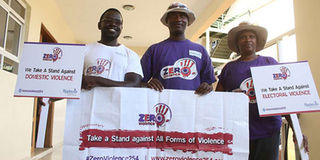Ghanaian lawyer spearheads war on gender-based violence

Ripples International Programme Officer Douglas (left), lawyer John Burke Baidoo (centre) and Vice Chancellor Koi Muchira Tirima propagate awareness against gender-based violence, at Three Steers Hotel in Meru County on April 12 2017. The organisation provides a safe haven for female victims of sexual violence. PHOTO | FILE | NATION MEDIA GROUP
What you need to know:
- He is advocating for legal and policy change to ease access to justice for victims of GBV.
- Mr Baidoo has been training the police, health workers and NGO officers to promote ease access to justice.
When he came to Kenya five years ago, Ghanaian lawyer John Burke Baidoo had a straightforward agenda – to work with like-minded organisations in the fight against gender-based violence (GBV).
Mr Baidoo, now a resident lawyer at Ripples International, an NGO that provides a safe haven for girls who are victims of sexual violence, says his work is a calling that gives him satisfaction.
“As a male champion against gender-based violence, it is challenging and I am often frowned upon. To address GBV, however, it requires coordinated and sustained effort from both State and non-state actors,” he says.
And adds: “You have to pursue a multifaceted approach that aims at sealing loopholes that exist at policy level, legal framework and creating awareness.”
ANTI-VIOLENCE WALK
Currently, he is advocating for legal and policy change to ease access to justice for victims of GBV.
He is also advocating for amendments in the law to include emerging forms of violence attributed to technological advancement.
To show his zeal for this cause, in May 2017, Mr Baidoo participated in a 1,500km walk from Mombasa to Moyale to raise awareness on the different forms of violence.
The walk that covered 16 counties also aimed at raising Sh15 million as legal fee for survivors of domestic violence.
His efforts paid off and despite raising money for legal aid, the duo faced challenges due to lack of capacity in the police service, burdensome legal processes and cultural barriers that often frustrate the cause of justice.
POLICE TRAINING
Mr Baidoo notes that despite Kenya being a signatory to international treaties and protocols as well as having arguably one of the most progressive Constitutions in Africa, cases of GBV are staggering.
“The biggest problem is that despite all the laws, we are yet to involve the emerging forms of violence due to advancement of technology such as virtual sex, online solicitation of sex from minors, sharing of nude photos and videos and cyber blackmail. Hence, many perpetrators go free,” Mr Baidoo says.
He adds: "Also, victims of GBV have to file voluminous documents to seek one restraining order in court. We are advocating for a simple template that can be accessible online for victims. The huge files also become a disincentive to pro bono lawyers.”
In efforts to address these challenges, Mr Baidoo has been training the police, health workers and NGO officers to promote ease access to justice.
“We have established that in many cases, police officers mishandle or ignore cases of GBV. There are instances where they advise victims to settle the case out of court. We also have challenges in preservation of evidence, but we are thinking of ways to involve experts in doing so,” says Mr Baidoo.
GENDER DESKS
The human rights advocate is also pushing to have gender trainings included in the curriculum of the Kenya Police College.
“The police are the first line of defence and should be informed on how to handle victims of gender and domestic violence. In most police stations, gender desks are not operational anymore. This will be addressed if all officers are trained,” he notes.
Mr Baidoo recommends a shift in how cases of GBV are responded to and investigated so as to ensure justice for survivors.
“The difference between Kenya and other advanced jurisdiction is in how the cases of GBV are handled. In Kenya, police officers are not also keen on following cases of domestic violence and often casually recommend reconciliation,” says the anti-GBV campaigner.
Statistics from the Kenya Demographic and Health Survey (KDHS) 2014 show that Meru County has the highest cases of intimate partner violence in the country.
For this reason, the county government has since established a Sexual and Gender Based Violence Policy aimed at addressing the problem.
Mr Baidoo says they are focusing on increasing sensitisation campaigns in such regions.





